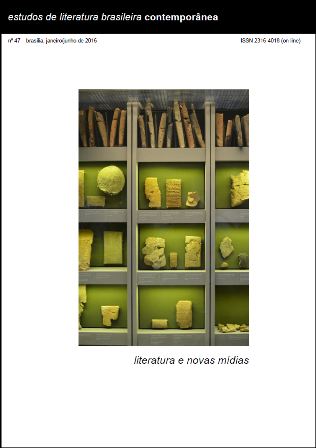Faces da literatura contemporânea:
o caso da poesia viral
DOI:
https://doi.org/10.1590/2316-4018472Abstract
Este artigo pretende discutir uma das faces da literatura contemporânea ”“ a poesia viral, presente em fanpages brasileiras do Facebook, colocando-a em perspectiva frente a uma demanda da lírica a partir da modernidade literária: a necessidade de concentração da linguagem poética e de exercício crítico. Além disso, serão discutidos alguns motivos para a resistência ante a dinâmica literária e comunicacional da internet que ainda hoje pode ser sentida por parte de professores e pesquisadores de literatura, tendo em vista a problemática do valor.
Downloads
References
BAUDRILLARD, Jean (2001). A transparência do mal. Ensaio sobre os fenômenos extremos. Tradução de Estela dos Santos Abreu. Campinas: Papirus.
BEETHOVEN, Ludwig van (1936). Carnets intimes. Tradução de M. V. Kubié. Paris: R. A. Côrrea.
BLOOM, Harold (2001). Como e por que ler. Tradução de José Roberto O”ŸShea. Rio de Janeiro: Objetiva.
BLOOM, Harold (1995). O cânone ocidental. Os livros e a escola do tempo. Tradução de Marcos Santarrita. Rio de Janeiro: Objetiva.
BORGES, Jorge Luis (1993). História universal da infâmia. Tradução de Flávio José Cardozo. São Paulo: Globo.
CAMPBELL, Joseph, MOYERS, Bill (1995). O poder do mito. Tradução de Carlos Felipe Moisés. São Paulo: Palas Athena.
EU ME CHAMO ANTÔNIO (2014). Disponível em: <https://pt-br.facebook.com/eumechamoantonio>. Acesso em: 30 nov. 2014.
EX-ESTRANHOS (2014). Disponível em: <https://pt-br.facebook.com/pages/ex-estranhos/1390204767864329>. Acesso em: 30 nov. 2014.
FREITAS, Maria Teresa de Assunção (2009). A formação de professores diante dos desafios da cibercultura. In: FREITAS, Maria Teresa de Assunção (Org.). Cibercultura e formação de professores. Belo Horizonte: Autêntica.
FREUD, Sigmund (2007). Uma recordação da infância de Leonardo da Vinci. Tradução de Maria João Pereira. Lisboa: BEI/Relógio de Água.
HOMO LITERATUS (2014). Disponível em: <http://homoliteratus.com/>. Acesso em: 30 nov. 2014.
JENKINS, Henry (2009). Cultura da convergência: a colisão entre os velhos e novos meios de comunicação. Tradução de Susana Alexandria. 2. ed. São Paulo: Aleph.
LÉVY, Pierre (1999). Cibercultura. Tradução de Carlos Irineu da Costa. São Paulo: 34.
LÉVY, Pierre (2001). O fogo liberador. Tradução de Lilian Escorel. São Paulo: Iluminuras.
LÉVY, Pierre (1996). O que é virtual? Tradução de Paulo Neves. São Paulo: 34.
MCWILLIAMS, Jenna, CLINTON, Katie (2013). Conclusion: reimagining and reinventing the English classroom for the Digital Age. In: JENKINS, Henry, KELLEY, Wyn (Ed.) Reading in a participatory culture: remixing Moby-Dick in the English classroom. New York, Berkeley: Teachers College Press, NWP.
MURRAY, Janet (2003). Hamlet no Holodeck: o futuro da narrativa no ciberespaço. São Paulo: Unesp.
POE, Edgar Allan (1987). Poemas e ensaios. Tradução de Oscar Mendes e Milton Amado. Rio de Janeiro: Globo.
PRADO, Márcio Roberto do (2014). Questões da lírica brasileira contemporânea: o caso da poesia viral. In: SEMINÁRIO DE PESQUISA DO PROGRAMA DE PÓS-GRADUAÇÃO EM ESTUDOS LITERÁRIOS, 15., e SEMINÁRIO INTERNACIONAL DE ESTUDOS LITERÁRIOS, 2. Araraquara, 16 a 18 set. 2014. Anais... Araraquara: Programa de Pós-Graduação em Estudos Literários/Unesp.
SCHLEGEL, Friedrich (1994). Conversa sobre a poesia e outros fragmentos. Trad. Victor-Pierre Stirnimann. São Paulo: Iluminuras (Biblioteca Pólen).
UM MILHÃO (2014). Disponível em: <https://pt-br.facebook.com/MilhaoPoesia >. Acesso em: 30 nov. 2014.
Downloads
Published
How to Cite
Issue
Section
License
Authors who publish in this journal agree to the following terms:
a) The authors maintain the copyright and grant the journal the right of first publication, the work being simultaneously licensed under the Creative Commons Attribution License-Non Commercial 4.0 which allows the sharing of the work with acknowledgment of the authorship of the work and publication this journal.
b) Authors are authorized to enter into additional contracts separately, for non-exclusive distribution of the version of the work published in this journal (eg publish in institutional repository or as a book chapter), with authorship recognition and publication in this journal.
c) Authors are allowed and encouraged to publish and distribute their work online (eg in institutional repositories or on their personal page) after the editorial process, as this can generate productive changes, as well as increase the impact and citation of published work (See The Effect of Free Access).
d) The authors of the approved works authorize the magazine to, after publication, transfer its content for reproduction in content crawlers, virtual libraries and the like.
e) The authors assume that the texts submitted to the publication are of their original creation, being fully responsible for their content in the event of possible opposition by third parties.


